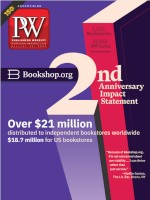“Digitization has made book publishing more efficient.”
According to the “Global Book Publishers Market Report (2021 to 2030): Covid 19 Impact and Recovery,” worldwide sales of e-books are predicted to grow at a compound annual growth rate of 11.7% in the forecast period. This continues a trend that started in 2008 with the introduction of e-reading devices, most prominently Amazon’s Kindle.
Looking at the volume of e-books released each year since 2008, many titles are published directly on self-publishing platforms such as Smashwords or Kindle Direct Publishing. This has created a plethora of new information for traditional publishers—not only about which books are released but also about how individual titles, authors, and entire genres are perceived by readers.
In new research with my colleague Imke Reimers from Northeastern University, we studied how publishers use the information generated through digitization—such as online reviews, detailed bestseller lists, and download figures—to make decisions. Platforms such as Amazon and Goodreads, as well as services such as BookScan or Bookstat, provide new sources of data that can be tapped to make decisions about which authors to work with and which manuscripts to buy.
Using data on almost 50,000 book deals over a period of 12 years starting in the early 2000s, we looked at how digitization has affected the relationships between authors and publishers. In particular, we studied how the advances that authors receive for individual titles or series changed after 2008. As we looked at the data, it became clear that one genre is much more affected by digitization than others: romance and erotica.
No other genre is published as frequently in the e-book format, and no other genre is published as frequently on self-publishing platforms. Likewise, no other genre has seen as many works with a self-publishing background appear on USA Today’s bestseller lists.
So we compared how advances to romance authors changed relative to advances paid to authors who write in other genres. This comparison allowed us to isolate the effect of digitization from other industry trends.
First, we found that advances to romance authors increased by about 20% after the introduction of the Kindle, compared to advances to authors in other genres. We identified two possible explanations for this rise. On the one hand, it might have been driven by a relative improvement of the authors’ bargaining power, given that they now had the option to circumvent traditional publishers and use self-publishing platforms to find their audiences. Alternatively, it could have been driven by an increase in demand for romance books after spectacular hits such as Fifty Shades of Grey.
Secondly, we found that publishers benefitted from the data that became available to them as a result of digitization. To explore this, we took our analysis one step further and asked whether the authors involved in the book deals we reviewed eventually turned out to be successful in the market. This allowed us to study whether publishers’ predictions about manuscripts’ market potential (which we approximate with the size of advances to authors) are accurate.
Strikingly, we found that publishers made relatively fewer errors when choosing manuscripts after the arrival of Kindle, and these improvements are again more substantial for romance authors. This is true for both types of errors: false positives (high advances for manuscripts that eventually flop) and false negatives (low advances for manuscripts that eventually become bestsellers).
In addition, based on regression analyses that estimate whether a book from a deal becomes a bestseller, we found that an advance to a romance author can predict a book’s success at making USA Today’s top 150 bestseller list 33% more accurately, relative to before 2008 and to authors in other genres. This led us to conclude that digitization has made book publishing more efficient.
Finally, we found that publishers that are more likely to invest resources in data analytics (as measured by relevant job postings) see the largest improvements in prediction.
In summary, our research shows the multidimensional effects of digitization in book publishing. While the availability of self-publishing platforms may have hurt traditional publishers’ bargaining power with authors, the increased availability of information has in turn proved advantageous to publishers. And publishers that have the resources to make sense of the data provided by digitization are in a better position to decide which potential investments are more likely to become successful as opposed to those with only marginal appeal.
Christian Peukert is associate professor of digitization, innovation, and intellectual property at HEC Lausanne. The study “Digitization, Prediction and Market Efficiency: Evidence from Book Publishing Deals” was published online on Jan. 12, 2022, by the journal Management Science.



 Volume 269
Issue 5
01/31/2022
Volume 269
Issue 5
01/31/2022





